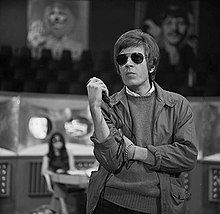Scott Walker | |
|---|---|
 Walker on Dutch TV, 1968 | |
| Background information | |
| Birth name | Noel Scott Engel |
| Born | January 9, 1943 Hamilton, Ohio, U.S. |
| Died | March 22, 2019 (aged 76) London, England |
| Genres | |
| Occupations |
|
| Instruments |
|
| Years active | 1958–2019 |
| Labels | |
| Formerly of | The Walker Brothers |
| Website | 4ad |
Noel Scott Engel (January 9, 1943 – March 22, 2019),[1] better known by his stage name Scott Walker, was an American-British singer-songwriter and record producer who resided in England. Walker was known for his emotive voice and his unorthodox stylistic path which took him from being a teen pop icon in the 1960s to an avant-garde musician from the 1980s to his death.[2][3] Walker's success was largely in the United Kingdom, where he achieved fame as a member of pop trio the Walker Brothers, who scored several hit singles, including two number ones, during the mid-1960s, while his first four solo albums reached the top ten during the later part of the decade, with the second, Scott 2, reaching number one in 1968. He lived in the UK from 1965 onward and became a UK citizen in 1970.[4]
After the Walker Brothers split in 1967, he began a solo career with the album Scott later that year, moving toward an increasingly challenging style on late-1960s baroque pop albums such as Scott 3 and Scott 4 (both 1969).[5][6] After sales of his solo work started to decrease, he reunited with the Walker Brothers in the mid-1970s.[2][3] The reformed band achieved a top ten single with "No Regrets" in 1975, while their last album Nite Flights (1978) marked the beginning of Walker taking his music in a more avant-garde direction. After a few years hiatus, Walker revived his solo career in the mid-1980s, progressing his work further towards the avant-garde;[6][7][8] of this period in his career, The Guardian said "imagine Andy Williams reinventing himself as Stockhausen".[3] Walker's 1960s recordings were highly regarded by the 1980s UK underground music scene, and gained a cult following.
Walker continued to record until 2018. He was described by the BBC upon his death as "one of the most enigmatic and influential figures in rock history".[9]
- ^ Monroe, Jazz (March 25, 2019). "Scott Walker Dead at 76". Pitchfork. Retrieved June 21, 2019.
- ^ a b Harrison, Ian (2013). "Splendid Isolation". Mojo. ISSN 1351-0193.
- ^ a b c Hattenstone, Simon (November 23, 2012). "Scott Walker: Brother beyond". The Guardian. Retrieved July 22, 2017.
- ^ Cavanagh, David (July 11, 2013). "Scott Walker – The Collection 1967–1970". Uncut. Retrieved January 5, 2017.
- ^ Plagenhoef, Scott (August 11, 2008). "Scott Walker 'Til the Band Comes In". Pitchfork Media. Retrieved July 15, 2016.
- ^ a b Leone, Dominique (November 17, 2003). "Top 100 Albums of the 1990s". Pitchfork Media. Retrieved July 15, 2016.
- ^ Mendelsohn, Jason; Klinger, Eric (February 20, 2015). "Scott Walker – 'Scott 4'". PopMatters. Retrieved July 15, 2016.
- ^ Shafer, Cody Ray (July 2, 2014). "Scott Walker and Sunn O))) Working on Album: Avant-Garde Legend Teams Up With Experimental Metal Band". Under the Radar. Retrieved July 15, 2016.
- ^ Savage, Mark (March 26, 2019). "Scott Walker, influential rock enigma, dies aged 76". BBC News. Retrieved March 26, 2019.